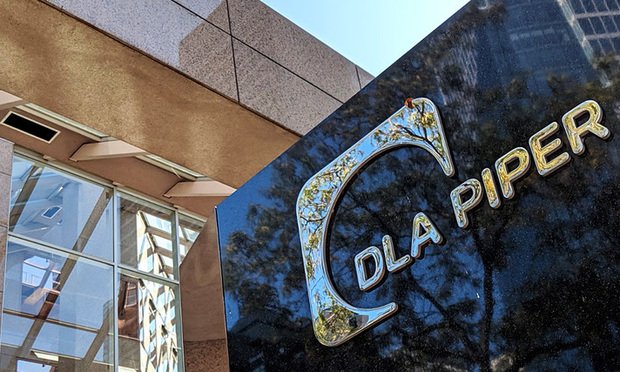Exasperated Texas Judge Warns Lawyers in Recruiter Case Against 'Game Playing'
U.S. magistrate judge Andrew Austin expressed frustration with the defendant's lawyers from DLA Piper, as the parties argue over process rather than the facts of the case.
May 04, 2020 at 12:11 PM
4 minute read
 DLA Piper offices. Credit: Mike Scarcella / ALM
DLA Piper offices. Credit: Mike Scarcella / ALM
A U.S. magistrate in Texas is urging the lawyers in a legal recruitment lawsuit to start focusing more on the facts of the dispute than dwelling on matters of process, as he suggested that a recent dustup over subpoenas issued to law firms was wasting "a lot of time and money."
The judge, Andrew Austin, expressed frustration about what he called "game playing" in the case, which involves a Texas recruiter's trade secret claims against a former employee named Evan Jowers. Austin, of the U.S. District Court for the Western District of Texas, on Friday denied Jowers' move to stop his former employer, MWK Recruiting Inc., from sending additional third-party subpoenas to other law firms.
Austin criticized Jowers' lawyers at DLA Piper for the court filing they submitted in their effort to stop MWK from sending out any more subpoenas. The filing had "certified," as required by the court's local rules, that the DLA Piper lawyers had met and conferred with MWK's lawyers in good faith before filing the motion. Reading an email chain during a telephonic hearing Friday, the judge said the certification was a "demonstrably false statement by a licensed attorney."
DLA Piper associate James Bookhout and Marc Katz, managing partner of the firm's Dallas office, apologized for the filing. "I do hear you loud and clear," Bookhout told the judge at one point. Bookhout blamed a "miscommunication" between himself and a senior DLA Piper attorney who had signed the certification.
"Unfortunately I did not see it again before it was filed," Bookhout said. He added: "We absolutely understand your frustration and I do apologize, your honor, for any statement in that certificate of conference that was not 100% accurate."
He said he would never "knowingly approve anything to any court that I did not know to be accurate." Bookhout said a new certification was submitted the next day to clarify the issue.
Austin said that sides in the case "are spending more time fighting about process, as opposed to what the actual facts of the dispute are about—wasting a lot of time and money. And if you want to waste your client's time and money, that's fine. But I'm not going to let you waste the court's time on this case."
Austin's remarks about process came just days after he criticized how the law firm Kirkland & Ellis had responded to a subpoena from MWK. The recruiting firm, which sued Jowers for allegedly breaking a noncompete agreement, sent out subpoenas to firms seeking placement information. The subpoena to Kirkland sought names and payment records that Jowers had made through 2019. Kirkland's resistance to the subpoena drew a rebuke from Austin.
Austin said in an order that he "could not be more disappointed with the manner in which [Kirkland & Ellis] has handled this subpoena." He said a Kirkland lawyer's "petty, technical, overly-argumentative emails are a study in what is wrong with civil discovery in our court system today."
MWK's Robert Kinney told ALM last week that Kirkland's response befuddled him. "We did a ton of work for Kirkland. I don't know why they decided they wanted to screw with us," Kinney said. A handful of firms compiled with MWK's subpoenas, he said. "Why would you not? It's a simple matter of spitting out an accounting report."
The judge on Friday denied Jowers' motion to stop additional subpoenas without prejudice. At the same time, Austin urged the lawyers in the case to turn to the substance of the dispute.
"Let's try to get this case focused on the legal merits of the dispute and not fighting about where documents are and what they might say," Austin said.
Read more
Rebuke of Kirkland in Recruiter's Federal Suit Raises Questions About Placement Secrecy
Major Lindsey Settles Suit Against Rival Recruiter MLegal and Former Partner
Major Lindsey, Suing Ex-Partner Over Noncompete, Faces Her Claims of Misconduct
This content has been archived. It is available through our partners, LexisNexis® and Bloomberg Law.
To view this content, please continue to their sites.
Not a Lexis Subscriber?
Subscribe Now
Not a Bloomberg Law Subscriber?
Subscribe Now
NOT FOR REPRINT
© 2025 ALM Global, LLC, All Rights Reserved. Request academic re-use from www.copyright.com. All other uses, submit a request to [email protected]. For more information visit Asset & Logo Licensing.
You Might Like
View All
O'Melveny, White & Case, Skadden Beef Up in Texas With Energy, Real Estate Lateral Partner Hires
5 minute read
Chamberlain Hrdlicka Taps a New Leader as Firm Follows Succession Planning Path
3 minute read
Midsize Firm Bressler Amery Absorbs Austin Boutique, Gaining Four Lawyers
3 minute read
Kirkland & Ellis Taps Former Co-Chair of Greenberg Traurig’s Digital Infrastructure Practice
3 minute readLaw Firms Mentioned
Trending Stories
Who Got The Work
J. Brugh Lower of Gibbons has entered an appearance for industrial equipment supplier Devco Corporation in a pending trademark infringement lawsuit. The suit, accusing the defendant of selling knock-off Graco products, was filed Dec. 18 in New Jersey District Court by Rivkin Radler on behalf of Graco Inc. and Graco Minnesota. The case, assigned to U.S. District Judge Zahid N. Quraishi, is 3:24-cv-11294, Graco Inc. et al v. Devco Corporation.
Who Got The Work
Rebecca Maller-Stein and Kent A. Yalowitz of Arnold & Porter Kaye Scholer have entered their appearances for Hanaco Venture Capital and its executives, Lior Prosor and David Frankel, in a pending securities lawsuit. The action, filed on Dec. 24 in New York Southern District Court by Zell, Aron & Co. on behalf of Goldeneye Advisors, accuses the defendants of negligently and fraudulently managing the plaintiff's $1 million investment. The case, assigned to U.S. District Judge Vernon S. Broderick, is 1:24-cv-09918, Goldeneye Advisors, LLC v. Hanaco Venture Capital, Ltd. et al.
Who Got The Work
Attorneys from A&O Shearman has stepped in as defense counsel for Toronto-Dominion Bank and other defendants in a pending securities class action. The suit, filed Dec. 11 in New York Southern District Court by Bleichmar Fonti & Auld, accuses the defendants of concealing the bank's 'pervasive' deficiencies in regards to its compliance with the Bank Secrecy Act and the quality of its anti-money laundering controls. The case, assigned to U.S. District Judge Arun Subramanian, is 1:24-cv-09445, Gonzalez v. The Toronto-Dominion Bank et al.
Who Got The Work
Crown Castle International, a Pennsylvania company providing shared communications infrastructure, has turned to Luke D. Wolf of Gordon Rees Scully Mansukhani to fend off a pending breach-of-contract lawsuit. The court action, filed Nov. 25 in Michigan Eastern District Court by Hooper Hathaway PC on behalf of The Town Residences LLC, accuses Crown Castle of failing to transfer approximately $30,000 in utility payments from T-Mobile in breach of a roof-top lease and assignment agreement. The case, assigned to U.S. District Judge Susan K. Declercq, is 2:24-cv-13131, The Town Residences LLC v. T-Mobile US, Inc. et al.
Who Got The Work
Wilfred P. Coronato and Daniel M. Schwartz of McCarter & English have stepped in as defense counsel to Electrolux Home Products Inc. in a pending product liability lawsuit. The court action, filed Nov. 26 in New York Eastern District Court by Poulos Lopiccolo PC and Nagel Rice LLP on behalf of David Stern, alleges that the defendant's refrigerators’ drawers and shelving repeatedly break and fall apart within months after purchase. The case, assigned to U.S. District Judge Joan M. Azrack, is 2:24-cv-08204, Stern v. Electrolux Home Products, Inc.
Featured Firms
Law Offices of Gary Martin Hays & Associates, P.C.
(470) 294-1674
Law Offices of Mark E. Salomone
(857) 444-6468
Smith & Hassler
(713) 739-1250






